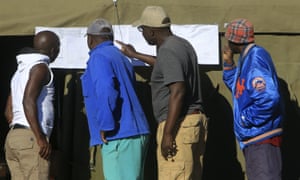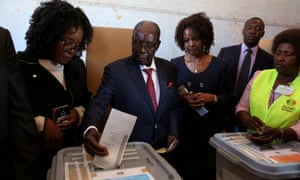Monitors warn of possible violence if results are contested as count continues

MDC supporters celebrate outside the party’s HQ in Harare, despite the lack of an official result. Photograph: Siphiwe Sibeko/Reuters
Tensions are rising in Zimbabwe as opposition fears intensify that the election count will be rigged, monitors warn of possible violence if the results are contested and authorities brace for protests.
Millions of people voted peacefully on Monday in the first election since the army removed Robert Mugabe from power last year. Long queues of voters formed outside polling stations and turnout was recorded at 75%.
The opposition leader, Nelson Chamisa, said early on Tuesday that he was “winning resoundingly”, a claim repeated by senior officials over the course of the day. His supporters gathered at their party’s headquarters in the capital during the afternoon, celebrating victory despite the lack of official results.
Supporters danced to music blaring from speakers mounted on a truck in the street outside the offices of the Movement for Democratic Change, which said it conducted its own count.
“We will never accept losing this election. We will protect our votes. We will protest.”
Police vehicles equipped with water cannon drove past the crowd.
Obert Mpofu, the home minister, said the government was concerned by “high levels of incitement to violence … by certain individuals and some political leaders who have declared themselves winners”.
“Such mischievous actions … leave the police with no option but to investigate and arrest if there is any breach of the law,” Mpofu told reporters.
The election pitted Chamisa, 40, a lawyer and pastor whose only previous experience of power was a stint as a minister in a coalition government several years ago, against Emmerson Mnangagwa, 75, a longtime Mugabe aide and head of the ruling Zanu-PF party.
Chamisa said in a 5am tweet that the MDC had “done exceedingly well”, according to results from a majority of polling stations. There was no confirmation of his claim.
The Zimbabwe electoral commission began announcing results during the afternoon, but only of seven parliamentary constituencies. Six were won by the ruling party, one by the MDC.
Voters also elected lawmakers and local representatives. The final result in the presidential poll is due by 4 August, but expected sooner.
Andrew Makoni of the Zimbabwe Election Support Network (ZESN), a coalition of civil society groups that deployed 6,500 election monitors, said: “The fear is that people are going to be disgruntled to the point where they go into the streets, and then there is a worry what the response will be from the security forces in the country.”
Officials are legally obliged to publish results from each of the 10,985 polling stations. Several civil society groups are collating these, though they are not allowed to release full results before the official tally is known.

Makoni said the ZESN was working to confirm reports from activists in the field that up to one-fifth of polling stations had not published results. This would mean as many as 1 million ballots cannot be independently verified.
Mnangagwa tweeted on Tuesday morning that he was “delighted by the high turnout and citizen engagement so far”, adding: “The information from our reps on the ground is extremely positive.”
Supporters said the president had won “a landslide victory”.
“The MDC are just extremely bad losers,” said Bright Matonga, a businessman and former ruling party minister. “They can protest but they will have to follow the law. It has to be peaceful. I am confident the law enforcement agencies will keep them under control.”
The two presidential candidates represent dramatically different ideologies and political styles, as well as generations. Pre-election opinion polls gave Mnangagwa, a dour former spy chief known as “the Crocodile” for his reputation for ruthless cunning, a slim lead over Chamisa, a brilliant if sometimes wayward orator.
Support for Zanu-PF historically has been deepest in rural areas, particularly the party’s Mashonaland heartland, where more than two-thirds of Zimbabwe’s 17 million people live.
Chamisa’s claims of imminent victory are consistent with a strategy over several weeks that has sought to put Zanu-PF on the defensive and make vote rigging more difficult.
Senior MDC officials accused the ZEC of deliberate delaying the release of full results.
If no candidate wins more than half the votes, there will be a runoff in five weeks. In 2008, dozens of people were killed before a runoff between Mugabe and the MDC’s founder, Morgan Tsvangirai, who died of cancer in February.
Another possibility is negotiations to form a coalition government.
Although the campaign has been free of the systematic violence that marred previous polls, the MDC has repeatedly claimed it has been hindered by a flawed electoral roll, ballot paper malpractice, voter intimidation and handouts to voters from the ruling party.

The party has repeatedly accused the electoral commission of bias and many of their allegations have been supported by independent analysts and experts.
Zimbabwe’s rulers know a fraudulent election would block the country’s reintegration into the international community and deny it the huge bailout package needed to avoid economic meltdown.
Almost four decades of rule by Mugabe has left Zimbabwe with a shattered economy, soaring unemployment and crumbling infrastructure.
For the first time since Zimbabwe gained independence in 1980 after a brutal guerrilla war against a white supremacist regime, Mugabe was not on the ballot paper. On Sunday the former president said he would not vote for his former party, Zanu-PF, or the current president, and endorsed Chamisa.
David Moore of the University of Johannesburg said he doubted there would be significant violence when the official result is announced.
“There is some truth in the cliche that Zimbabweans are a peace-loving people. Polls have shown a desire for a coalition or some kind of settlement that would help the economy. I don’t think there is any appetite for a battle in the streets,” Moore said.
COMMENTS